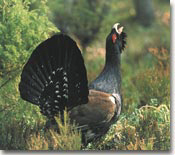BALTIC
FUND FOR NATURE PROGRAMMES
North-west
Russia terrestrial ecosystems programme
 North-west
Russia still preserves vast areas of relatively undisturbed
nature large enough to maintain natural processes and
ecosystems. This is a unique reserve of biological diversity
for the rest of northern Europe and its conservation
requires a well-developed and functional ecological
network and application of ecosystem-based approaches
in development. The Programme’s main goals are in supporting
protected areas, incorporating various forms of spatial
protection into the regional context and intensifying
international co-operation in building up ecological
networks. North-west
Russia still preserves vast areas of relatively undisturbed
nature large enough to maintain natural processes and
ecosystems. This is a unique reserve of biological diversity
for the rest of northern Europe and its conservation
requires a well-developed and functional ecological
network and application of ecosystem-based approaches
in development. The Programme’s main goals are in supporting
protected areas, incorporating various forms of spatial
protection into the regional context and intensifying
international co-operation in building up ecological
networks.
The Programme comprises projects focusing
on inventories and monitoring of rare and commercially
valuable species, on the development of species and
habitat conservation approaches, on improvement of PA
management practices. Populations of the white-tailed
sea eagle and brown bear were assessed in the region
collaboratively with WWF. The woodcock status was analysed
in co-operation with the French National Game Department.
BFN field groups are studying the floral and faunal
diversity of the Pskov and Leningrad regions, compiling
Red Data Books and Red lists.
 The
project “Towards sustainable development of the Sebezhsky
National Park” was implemented in 1999-2001. A new project
“Protected Areas Networking in North-west Russia”
has been
implemented since 2002 as a partnership with the Association
of Zapovedniks and National Parks of North-west Russia
and the Danish company Nordeco
is supported by the Danish Environmental Protection
Agency. The project objective is to strengthen and further
develop practical co-operation between zapovedniks and
national parks in the region. The
project “Towards sustainable development of the Sebezhsky
National Park” was implemented in 1999-2001. A new project
“Protected Areas Networking in North-west Russia”
has been
implemented since 2002 as a partnership with the Association
of Zapovedniks and National Parks of North-west Russia
and the Danish company Nordeco
is supported by the Danish Environmental Protection
Agency. The project objective is to strengthen and further
develop practical co-operation between zapovedniks and
national parks in the region.
The Programme’s main
perspective is in further widening practical partnership
networks of organisations in developing and implementing
regional nature conservation approaches in North-west
Russia.
Dr.
Alexei Zavarzin, Terrestrial programme co-ordinator
 White-tailed
eagle (1995 - 1999) - project results White-tailed
eagle (1995 - 1999) - project results
 Forest
mammals (1996 - 1999) - project results,
published in WWF
Baltic Bulletin 2/98 Forest
mammals (1996 - 1999) - project results,
published in WWF
Baltic Bulletin 2/98
 Woodcock
in Russia (since 1997) - project results Woodcock
in Russia (since 1997) - project results
 Promoting the protection
of important forests in the Green Belt between Russian Karelia
and Finland (2001 - 2002) - project results Promoting the protection
of important forests in the Green Belt between Russian Karelia
and Finland (2001 - 2002) - project results
 Towards sustainable
management of Sebezhsky National Park (2000 - 2001) - project
results Towards sustainable
management of Sebezhsky National Park (2000 - 2001) - project
results
 Flora and
Fauna Inventory in Pskov region and Protection
of Rare Species (since 1996) - projects results Flora and
Fauna Inventory in Pskov region and Protection
of Rare Species (since 1996) - projects results
 Protected area co-ordination,
networking and capacity building in European Russia (2002 -
2005) Protected area co-ordination,
networking and capacity building in European Russia (2002 -
2005)
 Improvement
of the regional legislation for protected areas and
conservation of rare species (2004 - 2005) Improvement
of the regional legislation for protected areas and
conservation of rare species (2004 - 2005)
|